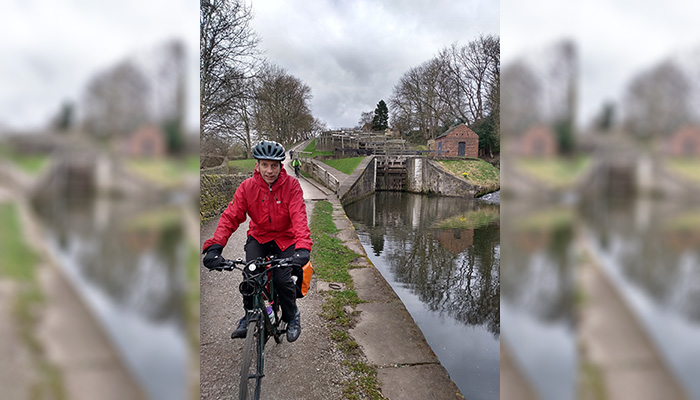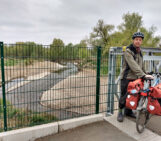
I’m Duncan Faulkner, a hydrologist working for JBA Consulting, and also President of the British Hydrological Society.
My first General Assembly – in Hamburg
Thirty years ago, 1995, I was about to board a plane for the European Geophysical Society (EGS) General Assembly in Hamburg, to present my first paper at a conference (on statistical modelling of rainfall, if I
remember right). Much has changed since then. EGS has long since been merged into the EGU, the assembly is in Vienna, and my attitude to travel has changed too. These days I try to travel in a gentler, less polluting, more immersive way. While I don’t think we will solve the climate and nature crises solely through consumer choices (we also need systemic change), it does seem vital that our lifestyles are consistent with our
scientific stance.
On my way to my 2nd GA
After 30 years of working as a hydrologist, I feel it is time for a second visit to EGU. Just about every working day over that time I have cycled to work, mostly over a Yorkshire hill to the head office of JBA where I work on a mixture of consultancy and research. So, I wondered, for a trip to Vienna, how about a more ambitious bike ride? A cycling pilgrimage (both hydrological and spiritual) along the rivers from the Yorkshire Dales to Lower Austria? Down the River Aire (flowing past our garden) and the Ouse to Hull, ferry to Rotterdam, along the Waal, up the Rhine, down the Danube, stop pedalling when we spot the EGU logo by the conference centre.
Those who live along the rivers
My cycling companion and I set off last week (having already completed a few parts of the route). The story of the river seems to be a silver thread woven through the lives of those we have encountered on our route
so far. We’ve stayed with Dutch friends working for Waterschap Rivierenland and Waterschap Aa en Maas, hearing about floods, droughts and agricultural pollution. Our ride has been diverted round works to raise and strengthen the dikes along the Waal, to a safety level equivalent to the 10,000 year return period. It’s impressive to see that the earthwork machinery is nearly all electrical, to reduce both CO2 and NOx emissions. One of our hosts lost her garden recently to make space for a widened dike.
Another host literally grew up on the river, as the daughter of a Rhine barge captain. As we rode on into Germany we were overtaking his successors, skilfully piloting their barges laden with raw materials or
containers along a narrowed channel flanked by wide sandy banks. After a dry winter the Rhine at Lobith (where the river enters the Netherlands) is about 1.5m lower than the long term average for early April.
Still, it’s an impressive river and I’m looking forward to seeing more of it, hearing more accounts of living by water and tasting more of the local food. Cycling does make you hungry!
To be continued…




